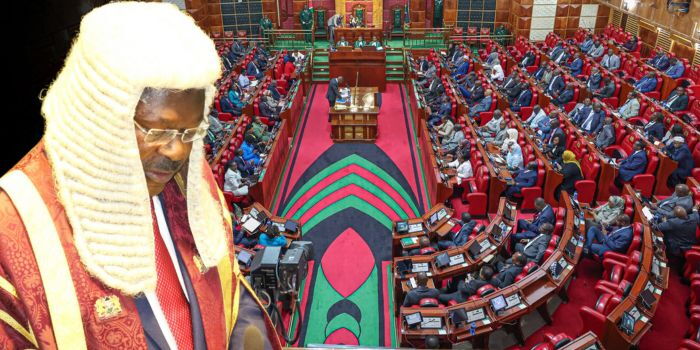A three-judge bench has declared the decision of National Assembly Speaker Moses Wetang’ula, determining that Kenya Kwanza holds the majority in Parliament, null and void.
Following the 2022 general elections, a dispute arose regarding which coalition held the majority.
On October 6, 2022, National Assembly Speaker Wetang’ula declared the Kenya Kwanza Coalition the majority party. Members of the Azimio la Umoja One Kenya Coalition contested this decision, arguing that they had more members and should be recognised as the majority.
In his ruling, Wetang’ula stated that, after considering post-election agreements, Kenya Kwanza had 179 members, while the Azimio la Umoja One Kenya coalition had 157.
Members of the National Assembly during a recent parliamentary session.
Wetang’ula emphasised that coalitions are dynamic, noting, “Coalitions are not cast in stone and are an evolving arrangement that can occur both before and after the elections.”
He further observed that several parties initially aligned with Azimio la Umoja had shifted allegiance to Kenya Kwanza post-election.
Wetang’ula remarked, “Some members alleged coercion and duress while entering into agreements with one of the coalitions. This, if true, is a serious affront to the democratic rights and freedoms that we enjoy as citizens of this country.”
However, 12 Kenyans filed a petition in court, arguing that the Azimio Coalition held the majority with 171 MPs while the Kenya Kwanza Coalition had 156 legislators.
They filed a petition challenging the Speaker’s declaration, asserting that it violated the Constitution and the Standing Orders of the National Assembly.
Three judges, Justice Jairus Ngaah (presiding), Justice John Mugwimi Chigiti, and Justice Mugambi, agreed, saying Wetang’ula lacked sufficient evidence to make the determination.
The court found that the Speaker had no justifiable basis for reassigning 14 members from various parties to Kenya Kwanza, a move that tipped the balance in favour of the coalition.
“The Speaker cannot fault the Registrar of Political Parties. She could not provide what she did not have. The Speaker ought to have presented the agreements that were allegedly submitted during the debate. Without the post-election coalition agreements, he had no basis for his decision,” the court ruled.
The decision throws a spanner into the works of the National Assembly, which operates with the Majority and Minority sides as different arms.
The majority side is tasked with driving the House business, that is, motions to be discussed and bills or motions emanating from the government.
Also, the division and control of Parliamentary Committees is determined based on the Majority and Minority sides.
Speaker of the National Assembly Moses Wetangula making remarks during the joint State of the Nation address by President William Ruto on Thursday, November 21, 2024.
National Assembly


